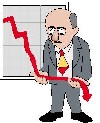One of the most ridiculous things that I seem to hear way too often is, “The government should be run like a business.” Or, “We should let private enterprise take over that government function; they’ll run it like a business.”
 And I’m wondering what business it is that they’re talking about. Enron? Lehman Brothers? Frontier Airlines? Circuit City? Countrywide Financial? Bethlehem Steel? Montgomery Ward? Levitz Furniture? Polaroid? Sunbeam? TWA? Arthur Anderson? WorldCom? American Home Mortgage? CompUSA? Wachovia? Mervyn’s? The Sharper Image? Madoff Investment Securities? Peanut Corporation of America? Long-Term Capital Management? Pan Am? Spiegel? Drexel Burnham Lambert? Eastern Airlines? Tower Records? Trump Casinos? Washington Mutual? Ya’ mean like those businesses?
And I’m wondering what business it is that they’re talking about. Enron? Lehman Brothers? Frontier Airlines? Circuit City? Countrywide Financial? Bethlehem Steel? Montgomery Ward? Levitz Furniture? Polaroid? Sunbeam? TWA? Arthur Anderson? WorldCom? American Home Mortgage? CompUSA? Wachovia? Mervyn’s? The Sharper Image? Madoff Investment Securities? Peanut Corporation of America? Long-Term Capital Management? Pan Am? Spiegel? Drexel Burnham Lambert? Eastern Airlines? Tower Records? Trump Casinos? Washington Mutual? Ya’ mean like those businesses?Guess what, folks. Businesses are run by human beings, just like governments. Dumb, smart, greedy, honest, careless, attentive, skilled, pompous, friendly, normal human beings. And governments are run like businesses.
With two major exceptions.
First, governments are not designed to put a profit in anyone’s pocket, so greed is not a built-in factor and costs can be more reflective of actual performance.
Second, my fellow citizens and I get to control all of our governments through periodic elections of their boards of directors and CEOs. And we’re not up against some corporation that holds five hundred thousand voting shares. Everyone’s vote is equal.
But just imagine if your local fire department was expected to earn a profit. Or the Tax Assessor’s office. Or the Road Department. Or the Sheriff. Need I elaborate?
 If anything, in today’s culture of righteous avarice, gratuitous megacorp profits, unwarranted executive compensation, imperious exploitattion of labor and arrogant disdain for the consumer, I’d hope governments are run less like business.
If anything, in today’s culture of righteous avarice, gratuitous megacorp profits, unwarranted executive compensation, imperious exploitattion of labor and arrogant disdain for the consumer, I’d hope governments are run less like business.
 If anything, in today’s culture of righteous avarice, gratuitous megacorp profits, unwarranted executive compensation, imperious exploitattion of labor and arrogant disdain for the consumer, I’d hope governments are run less like business.
If anything, in today’s culture of righteous avarice, gratuitous megacorp profits, unwarranted executive compensation, imperious exploitattion of labor and arrogant disdain for the consumer, I’d hope governments are run less like business.


